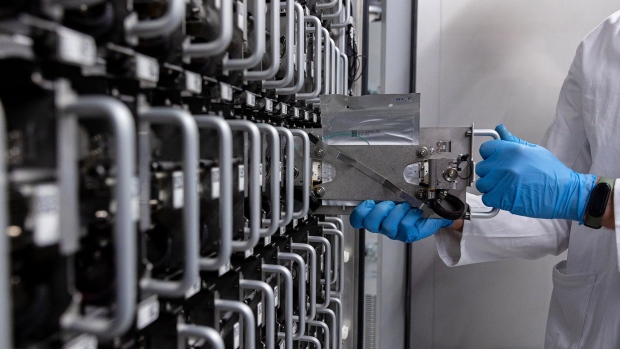Jul 7, 2022
Volkswagen’s CEO Talks Batteries, Supply Chains and the Porsche 911
, Bloomberg News

(Bloomberg) --
Volkswagen just supercharged its battery push.
On Thursday, the carmaker broke ground on a new cell factory in Salzgitter, Germany, one of five such facilities in Europe under its PowerCo unit.
VW expects the business to generate €20 billion ($20.4 billion) in revenue by the end of this decade and has indicated it’s open to eventually selling shares in the entity.
Salzgitter is home to VW’s main motor factory, and last year the carmaker opened an $80 million facility there to research, develop and test EV batteries. Roughly $2 billion will be invested in the new cell factory, where production is scheduled to begin in 2025.
Securing enough cells is key for VW if it wants to make good on its goal to overtake Tesla as the world’s leading EV maker. Bloomberg Television’s Matt Miller spoke to Chief Executive Officer Herbert Diess about his company’s battery push. Here’s an excerpt of the interview, edited for length and clarity.
So you broke ground on a new battery factory in Salzgitter. Where else do you want to put factories in Europe?
It’s not yet decided, competition is going on. It’s very likely that we are going to build the next one in Valencia, Spain, and then we have a little bit of time to look for something, maybe in eastern Europe, because we have significant car assembly plants there and we have to supply them. The battery plants should be relatively close to the assembly plants.
What about in the US? I’ve been to the VW plant in Chattanooga, Tennessee. Are you going to build a battery factory nearby?
That’s our plan, actually. We’re looking for sites. We’re just overhauling our US strategy, aiming to grow our US business, entering new segments, doubling up capacities. And, in line, we’re looking for a site for battery manufacturing.
Are you looking for partners on any of those projects, because I know you teamed up with Northvolt for one?
Northvolt, and we have a relatively big stake in Gotion, which is one of the bigger Chinese manufacturers where we have good access to technology. This ramp-up is also new for us. We are very experienced in manufacturing, but battery production is something new, so we need partners. We are invested in some startups and we are looking forward to a joint venture together with Bosch for the machine tools and equipment for those plants, so we’re really gearing up to become one of the bigger battery cell producers.
What are your criteria when you’re looking for a company to partner up with?
Our suppliers are also very openly discussing with us how they can help. We have a big team supporting Northvolt’s ramp up, so we are acquiring the skills we need to become a significant battery supplier.
We started this project already some three, four years ago. This is why we feel now in good shape. We are still open for some more partners because the demand for batteries will be huge because of this transition, also beyond auto.
In what sense, beyond auto?
As renewables are getting more and more share, we need storage capacity. The batteries we are producing could also be used for storage. if we have capacity, we would look at this.
Are you trying to become more self-reliant in each of your regions?
Battery production should be local because it’s heavy weight-lifting. It’s really a lot of material, a significant supply chain. You need a lot of lithium, phosphate, cobalt, nickel, copper foil — huge amounts. It should be close to the battery plants, because if not, transport cost is just too much.
What do think about the idea of moving away from the big, global supply chains after the problems we’ve seen?
If I look back at the supply chain problems, it was not about logistics or regional, it was about Covid, and it could happen 20 kilometers from Wolfsburg, and it could happen 5,000 kilometers away, on another continent.
Everything will get more expensive if we dream of localizing everything, and there are conditions which give some nations an advantage, cost-wise, and we should use that competitive advantage through the world. It’s a dream and it would not improve the world. Everything gets more expensive, and we’re not really getting better.
Wait times for the Porsche 911 are 12 months, 18 months, if I can even get an allocation. I’m looking around at the Ducati shops, they’re all completely sold out. When are we going to get back to normal?
We are ramping up the second half of the year, so delivery times should shorten, and then as we are a little bit cautious about the outlook next year, we can significantly reduce the waiting times, but we are also not really doubling up capacities, because the world will remain unstable. That’s our assumption, so we have to be a bit cautious.
©2022 Bloomberg L.P.





